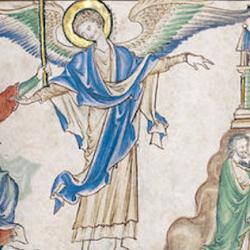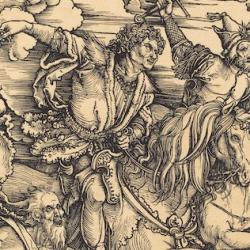The angelic “guards” at the gates of the new Jerusalem are, argues Margaret Barker (Revelation of Jesus Christ, 323), “probably a memory of the ancient guardians of the city known to Isaiah, ‘the watchmen set on the walls’ (Isa. 62.6).”
Barker claims that “These ‘watchers’ are concealed in many places in the Hebrew Scriptures, because the heirs of Josiah’s temple purge were responsible for transmitting many ancient texts and when they removed the host of heaven from temple worship (2 Kgs 23.5) they also removed them from the Hebrew Scriptures. The ‘rym, ‘watchers’, can be seen in Isaiah 33.8, disguised as the witnesses, ‘dym, or cities, ‘rym, very similar words (Hebrew d and r look very similar), and in Daniel 4.13, where there is ‘a watcher, a holy one.’”
Barker thinks this is behind David’s odd exchange with the people of Jebus, who claim that the blind and lame can guard the city: “When David tried to capture Jerusalem, the people of the city taunted him by saying, ‘The blind and the lame will ward you off (2 Sam. 5.6), but the blind and the lame conceal the ancient guardians of the city. ‘The blind’ were ‘the watching ones’, since the Hebrew verb ‘wr can mean to be blind or to be awake/aroused, and ‘the lame’ were the ones who guarded the thresholds of the city, the Hebrew verb psh meaning both ‘to pass over’ and ‘to limp.’ What David despised were not ‘the blind and the lame’ but the guardian angels of the city, the gates and doors who lift up their heads as the LORD enters (Ps. 24.7-9).”
When the Jebusites boasted of their “alert” watchmen who “pass over” the city, David twisted the boast into an insult: Not “alert” but “blind”; not “on patrol” but “lame.”














